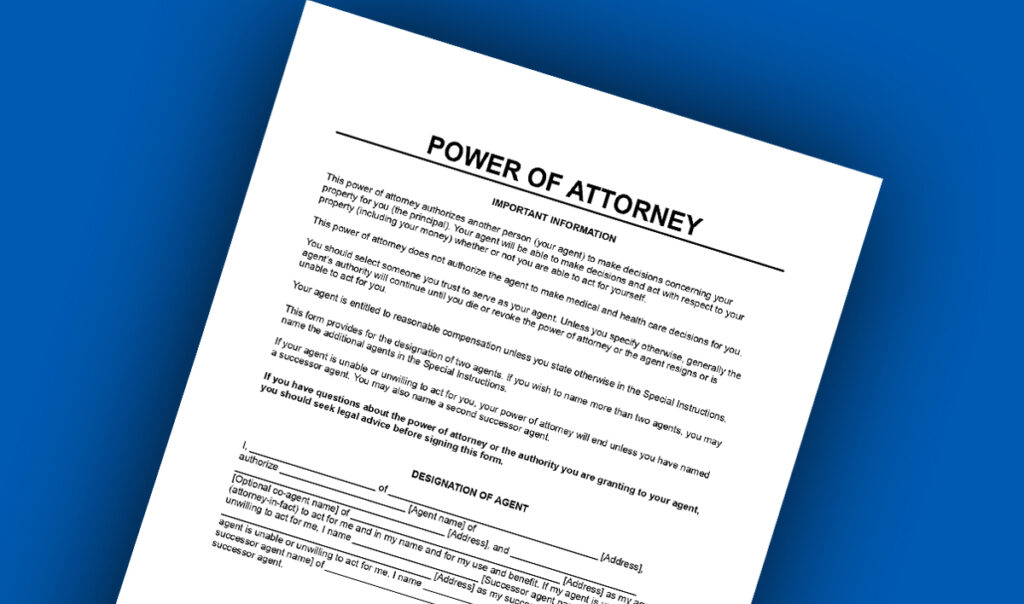A Power of Attorney (POA) is a vital legal document that grants an individual (the agent or attorney-in-fact) the authority to act on behalf of another person (the principal) in various legal, financial, and healthcare matters. Having a POA ensures that important decisions can be made even when the principal is unable to do so.
What is a Power of Attorney (POA)?
A Power of Attorney is a legally binding document that allows a designated person to make decisions on behalf of the principal. This can include handling financial transactions, managing real estate, or making medical decisions. The scope and duration of a POA depend on the type chosen by the principal.
Types of Power of Attorney
1. General Power of Attorney
A General Power of Attorney provides broad powers to the agent, allowing them to handle financial and legal matters on behalf of the principal.
Example:
- Managing bank accounts
- Signing contracts
- Buying or selling property
- Handling business transactions
2. Limited (Special) Power of Attorney
A Limited Power of Attorney grants the agent specific powers for a defined task or period.
Example:
- Selling a particular property
- Handling a single business transaction
- Representing the principal in legal matters temporarily
3. Durable Power of Attorney
A Durable Power of Attorney remains effective even if the principal becomes incapacitated.
Example:
- Managing financial affairs for an elderly individual
- Handling medical or legal matters in case of serious illness
4. Medical Power of Attorney
A Medical Power of Attorney allows the agent to make healthcare decisions for the principal when they are unable to do so.
Example:
- Choosing medical treatments
- Approving or refusing surgeries
- Making end-of-life decisions
5. Springing Power of Attorney
A Springing Power of Attorney becomes active only when a specified condition is met, such as the principal becoming incapacitated.
Example:
- Allowing a trusted individual to manage finances after the principal is declared mentally incapacitated
How to Create a Power of Attorney
Creating a Power of Attorney requires careful planning. Follow these steps to ensure a valid and legally binding POA:
- Determine the Type of POA – Choose the type of POA that suits your needs.
- Select a Trusted Agent – Pick someone responsible and capable of handling the assigned duties.
- Draft the POA Document – Include the necessary details such as agent powers, duration, and limitations.
- Sign the Document – The principal must sign the POA in the presence of witnesses or a notary public, as required by state laws.
- Distribute Copies – Provide copies to the agent, financial institutions, and any relevant parties.
Sample Power of Attorney Document
POWER OF ATTORNEY
KNOW ALL MEN BY THESE PRESENTS:
I, [Principal’s Full Name], residing at [Address], appoint [Agent’s Full Name], residing at [Agent’s Address], as my true and lawful attorney-in-fact to act on my behalf in legal, financial, and personal matters.
Powers Granted:
- Managing my financial accounts
- Conducting real estate transactions
- Signing legal documents
- Making healthcare decisions (if applicable)
This Power of Attorney shall be [durable/non-durable] and will remain in effect [until revoked/permanently].
IN WITNESS WHEREOF, I have signed this document on [Date].
Principal’s Signature: ________________________
Agent’s Signature: ________________________
Witness 1 Signature: ________________________
Witness 2 Signature: ________________________
Notary Public: ________________________
Revoking a Power of Attorney
A POA can be revoked at any time by:
- Creating a written revocation notice
- Informing all relevant parties
- Destroying existing copies of the POA
- Executing a new POA that supersedes the previous one
Why Having a POA is Important
A Power of Attorney is an essential legal tool that ensures continuity in decision-making. It prevents court-appointed guardianship and gives peace of mind, knowing that a trusted person will handle affairs in times of need.
Frequently Asked Questions (FAQs)
1. Can a Power of Attorney be changed or revoked?
Yes, the principal can revoke or modify a Power of Attorney at any time, provided they are mentally competent. This can be done by creating a revocation document and informing all involved parties.
2. Does a Power of Attorney expire?
A Power of Attorney can have an expiration date specified in the document. A Durable POA remains in effect even if the principal becomes incapacitated, while a General POA typically ends if the principal becomes mentally incompetent or deceased.
3. Can more than one person be named as an agent?
Yes, a principal can name multiple agents. They can be required to act together (jointly) or separately (severally), depending on how the POA is drafted.
4. Do I need a lawyer to create a Power of Attorney?
While it is possible to draft a Power of Attorney using templates, consulting a lawyer ensures that the document complies with state laws and adequately protects your interests.
5. What happens if no Power of Attorney is in place?
If a person becomes incapacitated without a POA, their loved ones may need to go through a court process to obtain guardianship or conservatorship, which can be time-consuming and expensive.
Conclusion
A Power of Attorney (POA) is an essential legal document that helps protect your interests when you are unable to make decisions. Whether for financial, medical, or legal matters, having a POA ensures that a trusted individual can act on your behalf.
Check Also: Authorization Letter Sample and Template (Free Download)
Disclaimer: This article is for informational purposes only and does not constitute legal advice. Consult a licensed attorney to ensure that your Power of Attorney meets legal requirements in your jurisdiction.
